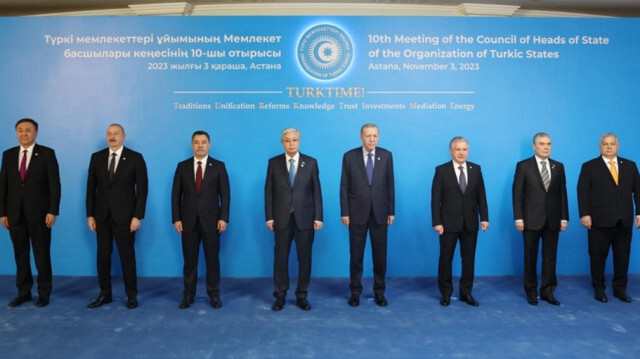
Israeli-Palestinian conflict can only be resolved through peaceful means based on relevant UN resolutions, 2-state solution, says declaration
Leaders of the Organization of Turkic States (OTS) on Friday expressed concern over the ongoing conflict between Israel and Palestine, and condemned all attacks targeting civilians in the besieged Gaza Strip.
A joint declaration, adopted at the 10th Summit of the Organization of Turkic States held in Kazakhstan’s capital Astana, called on all parties to the conflict to declare an “immediate cease-fire to protect civilians and to provide immediate and unhindered humanitarian aid throughout the Gaza Strip.”
The Israeli-Palestinian conflict can only be resolved through peaceful means based on relevant UN resolutions and the two-state solution, the Astana declaration said, adding a “guarantee mechanism” is required to ensure this.
The Israeli army has widened its air and ground attacks on the Gaza Strip, which has been under relentless airstrikes since the surprise offensive by Hamas on Oct. 7.
Nearly 10,800 people have been killed in the conflict, including at least 9,227 Palestinians and more than 1,538 Israelis.
The Astana declaration also underlined the importance of holding consultations among OTS member countries in order to develop an integrated stance on regional and international issues that concern the interests of the Turkic world.
Also, leaders confirmed their determination to advance multilateral cooperation based on the common history, language, culture, traditions and values of the Turkic peoples.
The group’s 10th heads of state summit gathered under the motto the Turkic Age, or Turk Time, seeking to forge a new era of cooperation and coordination among the world’s Turkic states.
The Organization of Turkic States, formerly called the Turkic Council, was established in 2009 as an intergovernmental organization made up of prominent independent Turkic countries that work together to elevate relations and union among themselves.
Its members are Türkiye, Azerbaijan, Kazakhstan, Kyrgyzstan and Uzbekistan, while Hungary as well as Turkmenistan and the Turkish Republic of Northern Cyprus have observer status.
Hello, the comments you share on our site are a valuable resource for other users. Please respect other users and different opinions. Do not use rude, offensive, derogatory, or discriminatory language.
The floor is all yours.








